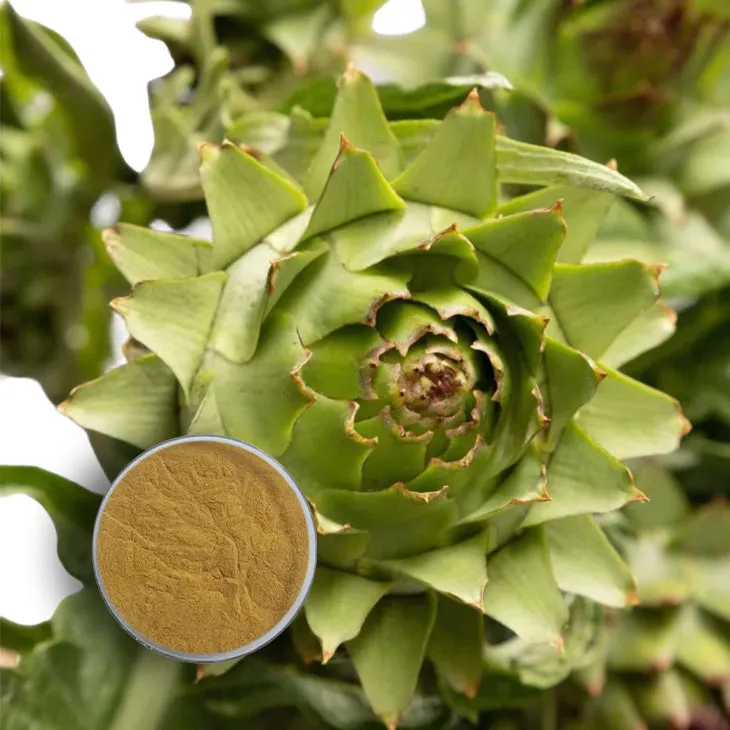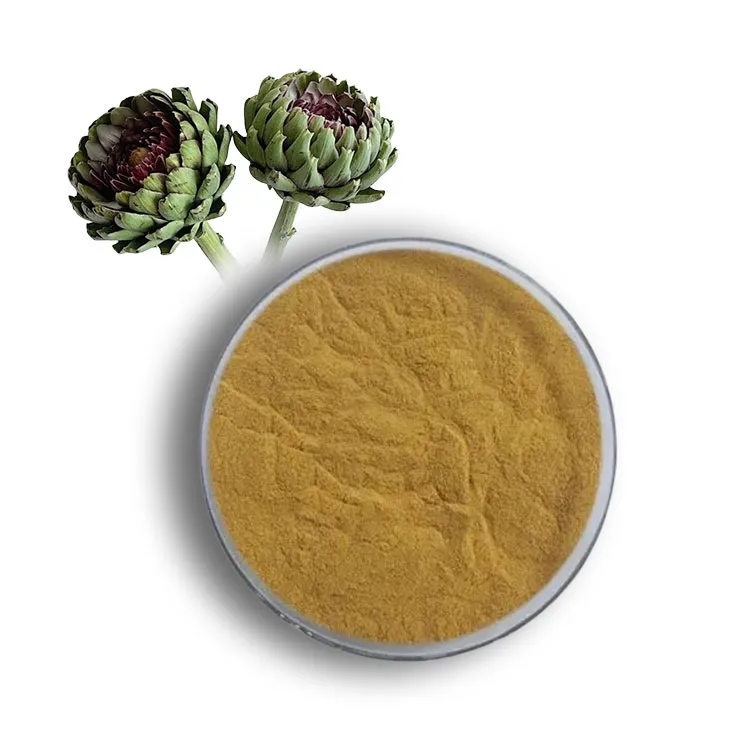- 0086-571-85302990
- sales@greenskybio.com
Organic artichoke leaf extract of trace components.
2024-11-27

1. Introduction
Micro - component - rich organic Artichoke Leaf Extract is a substance with great potential. Artichoke plants are native to the Mediterranean region, and their leaf extract has been used traditionally for its medicinal value. The micro - components in the extract are a complex mixture of phytochemicals. These phytochemicals are natural compounds found in plants that can have various effects on human health.

2. Components and Their Health - related Functions
2.1 Chlorogenic Acid and Blood Sugar Regulation
One such component is chlorogenic acid, which has been associated with blood sugar regulation. In recent studies, it has been shown that chlorogenic acid can influence the way the body processes glucose. This makes the artichoke leaf extract of interest in the management of diabetes or pre - diabetes conditions. For diabetic patients, maintaining stable blood sugar levels is crucial. The potential of Artichoke Leaf Extract in this regard could offer a natural and complementary approach to existing diabetes treatments.
2.2 Role in Cardiovascular Health
Another aspect is its potential role in cardiovascular health. The micro - components may help in reducing cholesterol levels and improving blood vessel function. High cholesterol levels are a risk factor for heart disease. By reducing cholesterol, Artichoke Leaf Extract could potentially lower the risk of developing cardiovascular problems. Additionally, improved blood vessel function means better blood flow throughout the body, which is essential for overall health.

3. Scientific Research on Artichoke Leaf Extract
From a scientific research perspective, the study of these micro - components in the artichoke leaf extract is still in progress. Scientists are constantly exploring the different phytochemicals present in the extract and their mechanisms of action. Research methods include laboratory experiments, animal studies, and some small - scale human trials.
3.1 Laboratory Experiments
In laboratory experiments, researchers can isolate and analyze the individual micro - components of the artichoke leaf extract. For example, they can study how chlorogenic acid interacts with enzymes involved in glucose metabolism at the cellular level. These experiments provide valuable insights into the basic chemical and biological properties of the components.
3.2 Animal Studies
Animal studies are often the next step. Scientists can administer artichoke leaf extract to animals, such as rats or mice, and observe the effects on various health parameters. For instance, they can measure changes in blood sugar, cholesterol levels, and blood vessel function over a period of time. These studies help to establish the safety and potential efficacy of the extract in a living organism before moving on to human trials.
3.3 Human Trials
Human trials, although limited so far, are also being conducted. In these trials, volunteers are given artichoke leaf extract, and their health markers are monitored. However, human trials are more complex than animal studies due to the variability in human physiology and lifestyle factors. Ethical considerations also play a major role in human trials, ensuring the safety and well - being of the participants.

4. Traditional Uses and Their Significance
While scientific research is ongoing, the current understanding and traditional uses already suggest a wide range of possible applications in promoting human health. Traditional medicine has long recognized the value of artichoke leaf extract.
4.1 Traditional Medicinal Practices
In traditional medicinal practices in the Mediterranean region, artichoke leaf extract was used for various ailments. It was often used to treat digestive problems, such as indigestion and bloating. The extract was believed to stimulate the digestive system and improve the overall function of the gastrointestinal tract.
4.2 Link to Modern Health Concepts
These traditional uses can be linked to modern health concepts. For example, a healthy digestive system is now known to be closely related to overall health, including the immune system and the absorption of nutrients. By improving digestion, artichoke leaf extract may have a positive impact on other aspects of health as well.
5. Future Prospects
The future prospects for artichoke leaf extract are quite promising. As research continues, more in - depth knowledge about its micro - components and their functions will likely be uncovered.
5.1 Potential in Pharmaceutical Development
There is potential for the development of new pharmaceuticals based on the components of artichoke leaf extract. For example, if the mechanism of blood sugar regulation by chlorogenic acid is fully understood, it could be used as a basis for developing new drugs for diabetes treatment. This could lead to more effective and targeted medications with fewer side effects.
5.2 Dietary Supplements and Functional Foods
Artichoke leaf extract also has great potential in the area of dietary supplements and functional foods. As consumers are becoming more health - conscious, there is a growing demand for natural products that can promote health. Artichoke leaf extract could be incorporated into dietary supplements or added to functional foods such as health bars or juices.
6. Challenges in the Study and Utilization of Artichoke Leaf Extract
However, there are also challenges in the study and utilization of artichoke leaf extract.
6.1 Standardization of Extract
One challenge is the standardization of the extract. Since the composition of the micro - components can vary depending on factors such as the variety of artichoke plants, growing conditions, and extraction methods, it is difficult to ensure consistency in the quality and effectiveness of the extract. Standardization is crucial for reliable scientific research and for the production of safe and effective products.
6.2 Regulatory Requirements
Another challenge is regulatory requirements. In different countries, there are different regulations regarding the use of herbal extracts in pharmaceuticals, dietary supplements, and functional foods. Meeting these regulatory requirements can be a complex and time - consuming process for companies interested in developing products based on artichoke leaf extract.
7. Conclusion
In conclusion, organic artichoke leaf extract rich in micro - components is a fascinating substance with a long history of traditional use and great potential for modern health applications. While scientific research is still in progress, the current evidence suggests that it could play a significant role in diabetes management, cardiovascular health, and other aspects of human health. However, challenges such as standardization and regulatory requirements need to be addressed to fully realize its potential. With further research and development, artichoke leaf extract could become an important part of the toolkit for promoting human health in a natural and sustainable way.
FAQ:
What are the main micro - components in the organic artichoke leaf extract?
One of the main micro - components in the organic artichoke leaf extract is chlorogenic acid. However, it is a complex mixture of phytochemicals, and there may be other important components yet to be fully explored.
How does the artichoke leaf extract help with blood sugar regulation?
The presence of chlorogenic acid in the artichoke leaf extract has been associated with blood sugar regulation. It may act on certain physiological mechanisms in the body related to glucose metabolism, but the exact pathways are still being studied.
Can the artichoke leaf extract really improve cardiovascular health?
It is believed that the micro - components in the artichoke leaf extract may help in reducing cholesterol levels and improving blood vessel function, which are important aspects of cardiovascular health. However, more research is needed to fully confirm these effects.
What is the traditional use of artichoke leaf extract?
Artichoke plants are native to the Mediterranean region. Traditionally, the leaf extract has been used for its medicinal value, although the traditional uses may vary among different cultures.
Is the study of micro - components in artichoke leaf extract complete?
No, from a scientific research perspective, the study of these micro - components in the artichoke leaf extract is still in progress. There is still much to learn about the exact composition and functions of these components.
Related literature
- Analysis of Phytochemicals in Artichoke Leaf Extract"
- "The Role of Artichoke Leaf Extract in Metabolic Disorders"
- "Micro - components in Organic Artichoke Leaf Extract: A Review"
- ▶ Hesperidin
- ▶ Citrus Bioflavonoids
- ▶ Plant Extract
- ▶ lycopene
- ▶ Diosmin
- ▶ Grape seed extract
- ▶ Sea buckthorn Juice Powder
- ▶ Fruit Juice Powder
- ▶ Hops Extract
- ▶ Artichoke Extract
- ▶ Mushroom extract
- ▶ Astaxanthin
- ▶ Green Tea Extract
- ▶ Curcumin
- ▶ Horse Chestnut Extract
- ▶ Other Product
- ▶ Boswellia Serrata Extract
- ▶ Resveratrol
- ▶ Marigold Extract
- ▶ Grape Leaf Extract
- ▶ New Product
- ▶ Aminolevulinic acid
- ▶ Cranberry Extract
- ▶ Red Yeast Rice
- ▶ Red Wine Extract
-
Dan Shen Root Extract/Salvia Root Extract
2024-11-27
-
Ginger Extract
2024-11-27
-
Hawthorn Extract
2024-11-27
-
Green coffee bean Extract
2024-11-27
-
Phellodendron Extract
2024-11-27
-
Echinacea Extract
2024-11-27
-
Propolis Extract Powder
2024-11-27
-
Andrographis Paniculata Extract Powder
2024-11-27
-
Lemon Juice Powder
2024-11-27
-
Scutellaria Extract
2024-11-27





















